
The UK Independence Party is a Eurosceptic, right-wing populist political party in the United Kingdom. The party reached its greatest level of success in the mid-2010s, when it gained two members of Parliament and was the largest party representing the UK in the European Parliament. The party is currently led by Neil Hamilton.
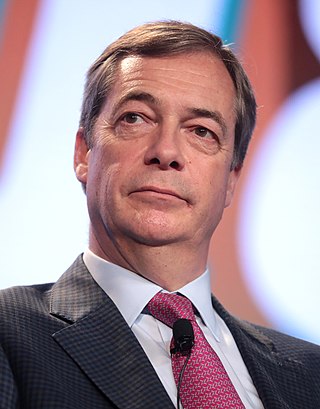
Nigel Paul Farage is a British broadcaster and former politician who was Leader of the UK Independence Party (UKIP) from 2006 to 2009 and 2010 to 2016 and Leader of the Brexit Party from 2019 to 2021. He served as Member of the European Parliament (MEP) for South East England from 1999 until the United Kingdom's exit from the European Union in 2020. He was the host of The Nigel Farage Show, a radio phone-in on the Global-owned talk radio station LBC, from 2017 to 2020. Farage is currently the Honorary President of Reform UK and a presenter for GB News.

Roger Helmer is a British politician and businessman. He was a Member of the European Parliament (MEP) for the East Midlands region from 1999 to 2017. Before becoming an MEP, he was a business executive.
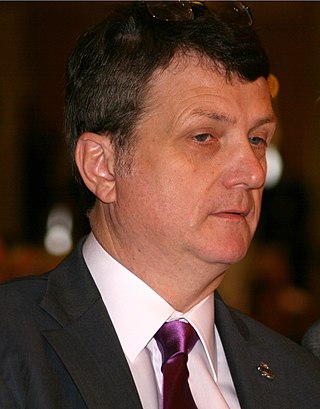
Gerard Joseph Batten is a British politician who served as the Leader of the UK Independence Party (UKIP) from 2018 to 2019. He was a founding member of the party in 1993, and served as a Member of the European Parliament (MEP) for London from 2004 to 2019.

Alan Sked is a British Eurosceptic academic notable for having founded the Anti-Federalist League and its successor the UK Independence Party (UKIP). He is Professor Emeritus of International History at the London School of Economics and has stood as a candidate in several parliamentary elections.

Malcolm Everard MacLaren Pearson, Baron Pearson of Rannoch is a British businessman and former Leader of the UK Independence Party (UKIP). He sits as an independent member of the House of Lords. A Eurosceptic, he was a staunch supporter of pro-Brexit campaign Leave Means Leave.

David Campbell Bannerman is a British Conservative Party politician who served as Member of the European Parliament (MEP) for the East of England from 2009 to 2019. He is currently Chairman of The Freedom Association. He served as Deputy Leader of UK Independence Party (UKIP) from 2006 until 2010, when he was replaced by Paul Nuttall.
The UK Independence Party (UKIP) held a leadership election in September 2006.

Paul Andrew Nuttall is a British politician who served as Leader of the UK Independence Party (UKIP) from 2016 to 2017. He was elected to the European Parliament in 2009 as a UK Independence Party (UKIP) candidate, and served as a Member of the European Parliament (MEP) for North West England between 2009 and 2019, sitting in the Europe of Freedom and Direct Democracy group. He left UKIP in December 2018, criticising the party's association with far-right activist Tommy Robinson, and joined The Brexit Party in 2019.
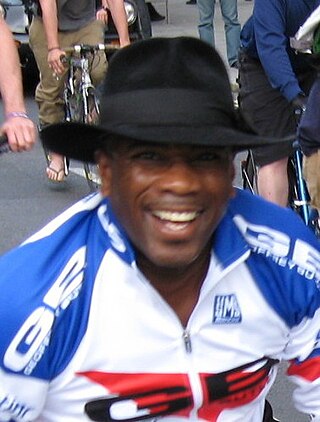
The UK Independence Party (UKIP) leadership election of 2010 was triggered on 17 August 2010 with the resignation of the incumbent leader, Lord Pearson of Rannoch, following difficulties during the 2010 general election campaign, with the result announced on 5 November 2010. Lord Pearson of Rannoch had been leader of the party since the previous leadership election, less than a year earlier. Jeffrey Titford was appointed interim leader during the summer by the UKIP National Executive Committee. Nigel Farage won the election with over 60% of the vote.

The 2014 European Parliament election was the United Kingdom's component of the 2014 European Parliament election, held on Thursday 22 May 2014, coinciding with the 2014 local elections in England and Northern Ireland. In total, 73 Members of the European Parliament were elected from the United Kingdom using proportional representation. England, Scotland and Wales use a closed-list party list system of PR, while Northern Ireland used the single transferable vote (STV).

Diane Martine James is a British politician who was a Member of the European Parliament (MEP) for South East England from 2014 to 2019. She was briefly leader-elect of the UK Independence Party (UKIP) from September 2016 to October 2016, but resigned before formalising her leadership. At the time of her election to the European Parliament, James was one of three UKIP MEPs for South East England, before joining the Brexit Party in 2019.

Independence from Europe was a minor, Eurosceptic political party in the United Kingdom. The party was first registered in June 2012 but remained inactive until it was launched in October 2013 by sole party leader Mike Nattrass, a disaffected member of the UK Independence Party (UKIP). It had no official political representation at the time of its dissolution in November 2017, but previously had one Member of the European Parliament (MEP) and three Councillors, all of whom were once members of UKIP.

Steven Marcus Woolfe is a British barrister, writer and commentator. He is currently the Director of the Centre for Migration & Economic Prosperity a research think tank studying population and immigration into the UK, Europe and US. He was a Member of the European Parliament (MEP) for North West England from 2014 until 2019. From 2014 he was a UKIP MEP but resigned to become an Independent MEP in October 2016 following his opposition to the party's overly negative policy on immigration. He remained Independent until July 2019. He is not a member of any political party or holds any political office.

William Milroy Etheridge is an English politician who was previously a Member of the European Parliament (MEP) for the West Midlands region. He was elected in 2014 as a UK Independence Party (UKIP) candidate, but left the party in October 2018 and joined the Libertarian Party. He joined the Brexit Party in 2019 but rejoined UKIP in September 2020.

Europe of Freedom and Direct Democracy was a Eurosceptic and populist political group in the European Parliament. The EFDD group was a continuation for the Eighth European Parliament of the Europe of Freedom and Democracy (EFD) group that existed during the Seventh European Parliament, with significant changes to group membership.
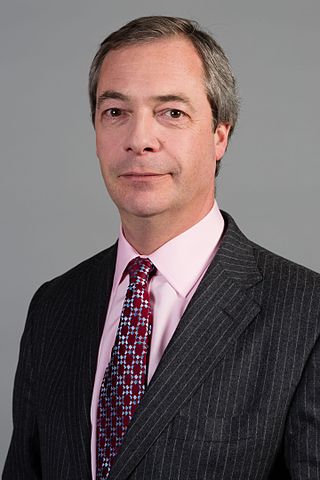
Nigel Farage is a former British MEP who has stood as a candidate representing eurosceptic parties UK Independence Party (UKIP) and The Brexit Party since 1994. He was a Member of the European Parliament representing South East England since the 1999 election, winning re-election four times. Farage has stood for election to the House of Commons seven times, in five general elections and two by-elections, but has not won any of those elections. He was also a proponent of the UK leaving the European Union in the 2016 referendum, in which the electorate voted to do so by 52% to 48%.
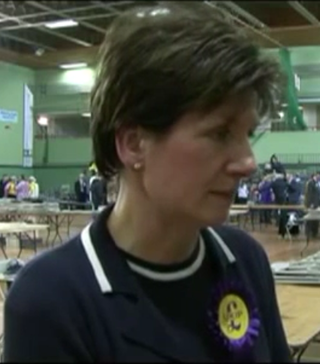
The September 2016 UK Independence Party leadership election was triggered after Nigel Farage, the leader of the UK Independence Party, announced on 4 July 2016, following the Leave result in the UK referendum on EU membership, that he would step down when a new leader had been elected.
The November 2016 UK Independence Party leadership election took place following the announcement on 4 October 2016 by Diane James, the leader-elect of the UK Independence Party, that she would not accept the leadership of the party, despite winning the leadership election 18 days earlier. Nigel Farage, whom James was to succeed after the previous leadership election following his resignation, was selected the next day to serve as interim leader.

Reform UK is a right-wing populist political party in the United Kingdom. It was founded with support from Nigel Farage in November 2018 as the Brexit Party, advocating hard Euroscepticism and a no-deal Brexit, and was a significant political force in 2019. After Brexit, it was renamed to Reform UK in January 2021, and became primarily an anti-lockdown party during the COVID-19 pandemic. Subsequently, in December 2022, it began campaigning on broader right-wing populist themes during the British cost-of-living crisis. Its greatest electoral success was as the Brexit Party, which won 29 seats and the largest share of the national vote in the 2019 European Parliament election.





















